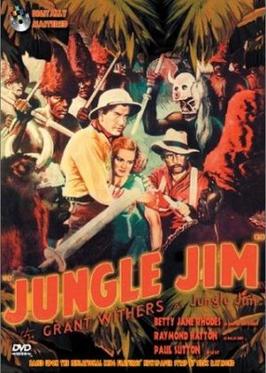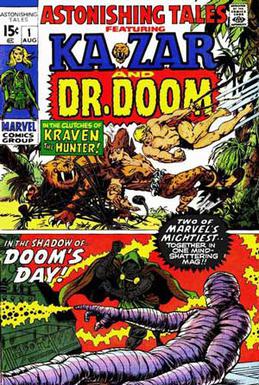Related Research Articles

William Bartlett Peet was an American children's book illustrator and a story writer and animator for Walt Disney Animation Studios.

The Jungle Book is a 1967 American animated musical adventure film produced by Walt Disney Productions and released by Buena Vista Distribution. Based very loosely on the "Mowgli" stories from Rudyard Kipling's 1894 book of the same name, it is the final animated feature film to be produced by Walt Disney, who died during its production. It was directed by Wolfgang Reitherman and written by Larry Clemmons, Ralph Wright, Ken Anderson, and Vance Gerry. Featuring the voices of Phil Harris, Sebastian Cabot, Louis Prima, George Sanders, and Sterling Holloway, the film's plot follows Mowgli, a feral child raised in the Indian jungle by wolves, as his friends, Bagheera the panther and Baloo the bear, try to convince him to leave the jungle before the ruthless tiger Shere Khan arrives.
Planet of Evil is the second serial of the 13th season of the British science fiction television series Doctor Who. It was first broadcast in four weekly parts on BBC1 from 27 September to 18 October 1975.
Michael Dennis Henry was an American football linebacker and actor. He was best known for his role as Tarzan in the 1960s film trilogy and as Junior in the Smokey and the Bandit trilogy.
Phoenix Five is an Australian science fiction television series which first screened on the ABC in 1970. It was later also screened on the Seven Network. It was part of a trilogy and followed on from the six part serial The Interpretaris in 1966 and seven part serial Vega 4 in 1968. However, it had 26 standalone episodes produced to make it viable as a syndicated series. Each of the series had different crews and casts but took place in the same future and used the same space organisation and miniatures, much as Star Trek did in the '80s and '90s, thus making it the first TV sci-fi franchise.

Whiplash is a British/Australian television series in the Australian Western genre, produced by the Seven Network, ATV, and ITC Entertainment, and starring Peter Graves. Filmed in 1959-60, the series was first broadcast in the United Kingdom in September 1960, and in Australia in February 1961.

Mike Dorsey was an English-born Australian theatre and television actor, publicity officer, and tour manager.

Carry On Up the Jungle is a 1970 British adventure comedy film, the 19th release in the series of 31 Carry On films (1958–1992). The film marked Frankie Howerd's second and final appearance in the series. He stars alongside regular players Sid James, Charles Hawtrey, Joan Sims, Terry Scott and Bernard Bresslaw. Kenneth Connor returns to the series for the first time since Carry On Cleo six years earlier and would now feature in almost every entry up to Carry On Emmannuelle in 1978. Jacki Piper makes the first of her four appearances in the series. This movie is a send-up of the classic Tarzan films. It features an unusually dark tone for the series, as the protagonists are faced with certain death after they are apprehended by a cannibalistic tribe in the jungle. The film was followed by Carry On Loving 1970.
Storm Boy is a 1976 Australian drama film based on the 1964 book of the same name by Colin Thiele, about a lonely boy and his pet pelicans living in a coastal wilderness with his reclusive father. It was the third feature film made by the South Australian Film Corporation, and is a highlight of the New Wave of Australian Cinema from the 1970s. The film was financed by SAFC, Seven Network and the Australian Film Commission.
"I Wan'na Be Like You (The Monkey Song)" is a song from Walt Disney's 1967 film The Jungle Book. The song was written by songwriters Robert and Richard Sherman, and was performed by singer and musician Louis Prima as King Louie, with Phil Harris providing additional vocals as Baloo the bear.

Jungle Jim is a 1937 Universal serial film based on Jungle Jim, the comic strip by Alex Raymond. Grant Withers starred as Jungle Jim, and Henry Brandon played the villainous Cobra.

Astonishing Tales is an American anthology comic book series originally published by Marvel Comics from 1970 to 1976. Its sister publication was Amazing Adventures.

Gorilla Biscuit a.k.a. Gorilla Biscuit: B Sides and Rarities is a compilation album by Australian rock group Hoodoo Gurus, released in August 1992.
Tezuka Productions Co., Ltd. is a Japanese animation studio founded by Osamu Tezuka in 1968. It is known for animating notable works such as Marvelous Melmo, the 1980 and 2003 Astro Boy series, and Black Jack. It is also the holder of the intellectual property of Tezuka's works; his son, Makoto Tezuka, currently aims to use the company to extend Tezuka's manga series with new issues and publish posthumous works such as Legend of the Forest.
Science fiction television has been produced in Australia since the 1960s, as a homegrown response to imported overseas US and British shows.

Tarzan and the Jungle Boy is a 1968 adventure film starring Mike Henry in his third and final appearance as Tarzan. Rafer Johnson and Aliza Gur co-star. The film was produced by Sy Weintraub and Robert Day, written by Stephen Lord and directed by Robert Gordon. Released on May 1, 1968, it is the twenty-eighth and final film in the Tarzan film series that began with 1932's Tarzan the Ape Man, and was followed by a self-titled remake film in 1981.
Riptide was an Australian adventure television series, starring Ty Hardin, which was first broadcast in 1969. The show featured a foreign lead actor and a foreign producer, similar in approach to the later series The Outsiders. Co-stars were Jonathan Sweet and Sue Costin, while guest roles featured Australian actors such as Tony Ward, Rowena Wallace, Michael Pate, Bill Hunter, Helen Morse, John Meillon, Norman Yemm, Chips Rafferty, and Jack Thompson. The series was filmed at Australian locations.
Strange Holiday is a 1970 Australian television film directed by Mende Brown and starring Jaeme Hamilton.
Phil Judd is an Australian sound engineer, managing director of PhilmSound Pty. Ltd., who is credited with post-production work on many well-known movies and several television series. He is not related to the New Zealand musician Phil Judd.
Artransa Park Film Studios (APFS), was an Australian motion picture production company and film animation studio. It was based in Sydney, Australia and founded by Grace Gibson and Alfred Edward Bennett. Artransa was a contraction of the American Radio Transcriptions of Australia. The company employed 90 staff, in 1967